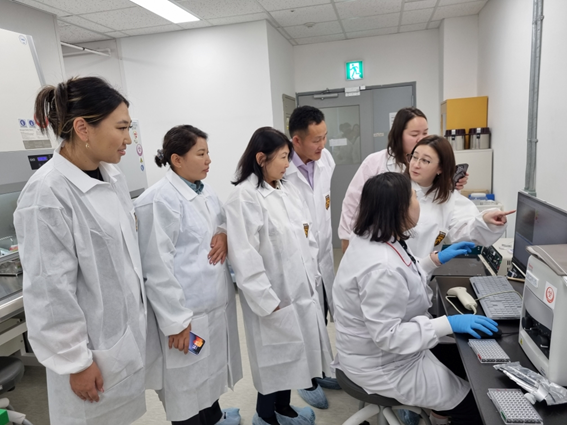contents area
Press Release
detail content area
- Date2023-11-15 10:30
- Update2023-11-15 10:30
- DivisionSpokesperson
- Tel02-3384-1555
[A summarized unofficial version of the press release]
KDCA Helps Mongolian NCCD Build up its capacity to Tackle AMR and other infectious disease issues
-
Support for EQA of AST and Laboratory Capacity Development as a WHO CC for AMR Reference and One Health Research
-
Share Korea’s technologies and experiences related to the operation of AMR Surveillance System
Osong, 9th November 2023 – The KDCA will provide technical support to the Mongolian National Center for Communicable Diseases (NCCD) in improving its capacity regarding antimicrobial resistance (AMR) surveillance including the external quality assessment (EQA) of antimicrobial susceptibility testing (AST).
This assistance is offered as part of World Health Organization Collaborating Centers (WHO CCs)' collaborative activities in 2023 as well as a project aimed to build stronger ties with Mongolia in response to infectious diseases.
Being recognized as an institution specialized in a specific field, WHO CCs are designated by the WHO to form part of an international collaborative network and carry out projects on global public health.
The Division of Antimicrobial Resistance Research of the Korea National Institute of Health (KNIH) has served as a WHO CC for AMR Reference and One Health Research in Korea since 2021.
The major tasks of the WHO CC for AMR Reference and One Health Research in Korea are as follows (but not limited to):
- Provide much-needed technical assistance to countries in building laboratory capacity in the Western Pacific Region
- Advise for the implementation of the EQA of AST and the WHO Global Antimicrobial Resistance and Use Surveillance System (GLASS)
- Propose research work on antimicrobial-resistant bacteria with an One Health perspective
The KDCA has pursued to put in place the EQA of AST in Mongolia, as requested by the Mongolian NCCD via the WHO Western Pacific Regional Office (WPRO).
*External Quality Assessment (EQA) is defined as a system for objectively checking a laboratory's performance by comparing the laboratory's testing to source outside the laboratory.
Prior to the implementation of the EQA of AST in Mongolia, the KNIH and Yonsei University College of Medicine jointly hosted an invitation training program (November 6-10) to train researchers of the Mongolian NCCD's laboratories on AMR diagnostics and EQA and share how Korea operates AMR surveillance system.
The KDCA has been working on a 5-year collaborative project (from 2023 to 2027) with the Mongolian NCCD in a bid to strengthen preparedness and response to emerging infectious diseases. This project intends to deepen technical collaboration with Mongolia in areas such as national laboratory capacity-building and the establishment of AMR surveillance system, and also plans to further expand the scope of bilateral collaboration.
KDCA commissioner Youngmee Jee said, "Mongolia is one of Korea's major partner countries in future response to emerging infectious diseases as bilateral trade between Korea and Mongolia is on the rise. In recognition of its importance, we will make continuous efforts to promote stronger ties with Mongolia."
She added, "As a WHO CC, the KNIH will endeavor to assist Mongolia in developing its AMR surveillance capacity. Moreover, we will strive to meet the demand of countries with less developed laboratory capacity by proactively providing technical support on enhancing AMR diagnostics and surveillance technologies, thereby ultimately contributing to improving global public health."
<Attachment: A picture taken during the invitation training program to train Mongolian NCCD’s researchers on AST>

* For detailed information, please refer to the press release written in the Korean language in the file attached below.
 This public work may be used under the terms of the public interest source + commercial use prohibition
This public work may be used under the terms of the public interest source + commercial use prohibition